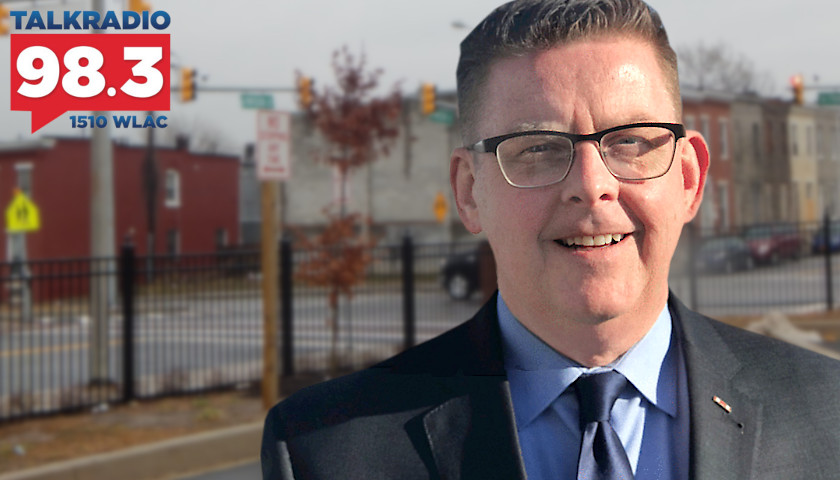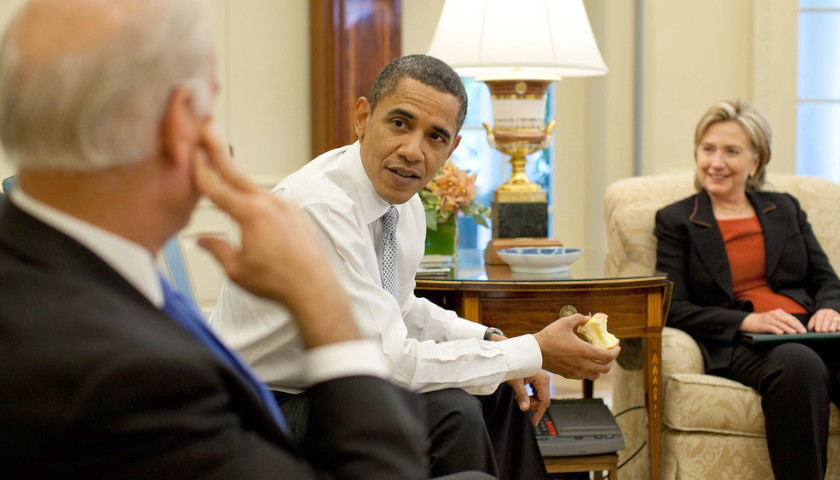On Tuesday’s Tennessee Star Report with Steve Gill and Michael Patrick Leahy – broadcast on Nashville’s Talk Radio 98.3 and 1510 WLAC weekdays from 5:00 am to 8:00 am – Gill and Leahy talked to One America News Networks Neil McCabe about the disgusting conditions in Elijah Cummings Baltimore district after he toured the areas yesterday.
Towards the end of the segment, the team questioned where $1.8 billion went from then-President Barack Obama’s stimulus law, which was allocated to Baltimore in 2015.
Leahy: Steve, we are joined now by our good friend, Neil McCabe from One America News Network. Neil, you were in Baltimore yesterday. Tell us about that. Did you have to take a passport and did you get any inoculation shots?
McCabe: Ah, you know I’ve had great times in Baltimore in the past but this is kind of a scary tour. We kind of went into some of the neighborhoods that are Elijah Cummings’s represents and it was really made me sort of uncomfortable. You see the filth. You see the garbage piling up.
You know, not just in these neighborhoods but there’s a war memorial, it’s like a museum, it’s directly opposite of city hall and the trash is piled up at the war memorial. There’s a rod iron fence around the thing because nobody can get into the building unless you have a swipe card or you work for the city.
The trash is piled up. You walk around city hall in Baltimore, weeds, broken glass, cigarette butts. The fountain is overflowing into the gravel so the birds are playing in the puddles that are flooding the gravel just in front of the building. The place is really despicable. This is one of our great cities.
Leahy: Well it was one of our great cities. The President’s characterization of Baltimore as a disgusting mess then, you see some evidence to support that. (Leahy laughs)
McCabe: There are places where fancy people can go and enjoy a ball game and go to the waterfront and have beers and oysters and crab cakes. And there are places where everybody can have a safe good time. But those are not the places where regular Baltimore people live and work if they can find work.
Leahy: Did you have any man on the street interviews or woman on the street interviews there and talk to people?
McCabe: We interviewed a number of people and that package is running now on One America News. I’m not sure where in the hour it’s running. It’s in the first half of the hour that they’re running it. I talked to this one woman who actually works for the state. And she says, “Well you know there’s a lot of violence.”
And I said, “Is it violence you can see? And she says, “Oh, people have been shot in front of me.” And I said, “Is that something you saw as a kid?” She says, “I never saw this growing up.” And it’s one of those places and you read about this and it’s almost like you read about in National Geographic where human life is not as valuable in Baltimore as it is in other cities.
And so she said she had a friend who is a very popular hairdresser and for his 28 birthday he went down to Miami and posted all these pictures partying for his birthday with his chains and what not saying what a great time he was having in Miami.
When he came home these gang members were waiting for him and they killed him and robbed him. And that was it.
Leahy: Wow.
McCabe: And she’s like, “And this happens like all the time.” It’s crazy. There’s no understanding this.
Gill: Neil, the HUD administrator, Lynn Patton, the regional administrator that has her area of coverage over Baltimore was on Fox News and pointed out, she said that President Trump has provided 16 billion in 2018 alone in grants to Baltimore.
The US taxpayers have done this. But $16 billion pouring into Baltimore to deal with infrastructure and homelessness. Under President Obama, one point $6 billion in that infrastructure shovel ready race to the top type money was provided to Baltimore.
Is there any evidence that any of this money has actually improved the quality of life in Baltimore? I mean we’re talking billions of dollars here.
McCabe: I think you could build some houses for $16 billion.
Gill: You could certainly clear out the dilapidated buildings and mow the grass.
McCabe: I think the saddest thing, and this happened years ago, but when that earthquake hit Haiti, and they sent rightfully, they sent the 82nd Airborne and the Army down there to clear out, set up the generators, set up field hospitals, they had construction machines that clear out the streets and to feed people. They opened up kitchens.
And if I was in Haiti, I’d be saying this to myself, “Wow, you could of done this whenever you wanted to. I mean, I’m glad you’re here now because of the earthquake, but the Americans could have shown up yesterday or a year ago.”
And I think you know people in Baltimore, they see what we do in other countries. To walk around these neighborhoods and see there’s no hope. There’s no future and it’s very scary.
Gill: I mean why wouldn’t we send in some bulldozers and bulldoze down some of these dilapidated homes that become a shelter for rats. For crime. For the homeless. Clear it out and at the very least you’ll have grass. (Chuckles) That you can easier mow. At least clear out the havens of the vermin, the rodents, the crime, the drug houses. Why haven’t they just cleared that stuff out?
McCabe: Well you know, you have the Republican governor, Larry Hogan and he’s more interested in setting himself up for a future run for President. He was more worried about and giving interviews for the New York Times saying he wanted to run against Trump in the primaries in New Hampshire. I think the last three mayors of Baltimore have resigned in disgrace or are in jail.
Leahy: Yeah.
McCabe: You have problems with the police. The police know that if anybody complains about the police the police are going to be blamed. Not the criminals. So the police are pulling back. And when you have a city where the police, not afraid for their own personal safety but they’re afraid professionally.
Like my career is over. If I go into this neighborhood and do what I have to do, I’m going to lose my house. And my families going to have to figure out what to do because we’re going to lose my income. I think professionally the police have pulled back.
And don’t forget too. There’s a lot of city employees who make fantastic money in Baltimore. Who live great lives. And you can see there are hospitals. In one neighborhood called Cherry Hill, there’s a very large post office, a distribution center where’s there’s a lot of great government union jobs there.
Well, nobody who works at that post office facility lives in the Cherry Hill neighborhood. And so you create these kinds of pocket of jobs and sort of government grants and contracts. But they go to the people who are connected. Those sweetheart deals always go to the people who don’t need it. The people who need help, they’re not connected. They’re not getting those jobs.
Gill: And your first step to prosperity is to have security. If you don’t secure the neighborhood’s if they’re not safe, businesses are not going to plant there. They’re not going to grow there. People aren’t going to live there where they can spend money in those neighborhoods.
Again, the first step is kind of like again in my view Neil, settlers when they moved west, the first thing you did was you start chopping down the trees creating open space to build homes, cities, forts, to establish a foothold of civilization.
And I’m not saying they’re uncivilized in these communities, but when you have dilapidated torn down buildings, it’s kind of like Berlin in post-WWII. You cleaned up the rubble so you could rebuild. They haven’t cleaned up the rubble.
McCabe: I’m telling you as somebody during the March 2010 national elections in Iraq, I walked around the block of this police headquarters in the city of Bosra. I took off my helmet.
I took off my flack jacket and I just walked around in my regular uniform just to see how safe it was. It was ridiculous. It was like a little experiment, right? (Chuckles) I just wanted to see how safe the city was.
Leahy: And it was relatively safe at that time?
McCabe: I felt safer than I felt in Baltimore yesterday.
Leahy: One last question for you Neil. Did you encounter any rats in the number nine rattiest city in America in Baltimore yesterday?
McCabe: I read a very good article on Breitbart. (Leahy laughs) I didn’t see any rats. Of course, if you really want to see some rats go to Union Station in Washington about a half a mile from the Capitol dome. (Leahy chuckles)
If you don’t already have One America News Network, call your local cable provider and watch One America News here in Nashville, Middle Tennessee.
Listen to the full hour:
– – –
Tune in weekdays from 5:00 – 8:00 am to the Tennessee Star Report with Steve Gill and Michael Patrick Leahy on Talk Radio 98.3 FM WLAC 1510. Listen online at iHeart Radio.
Background Photo “West Baltimore Station” by Adam Moss. CC-SA BY 2.0.





